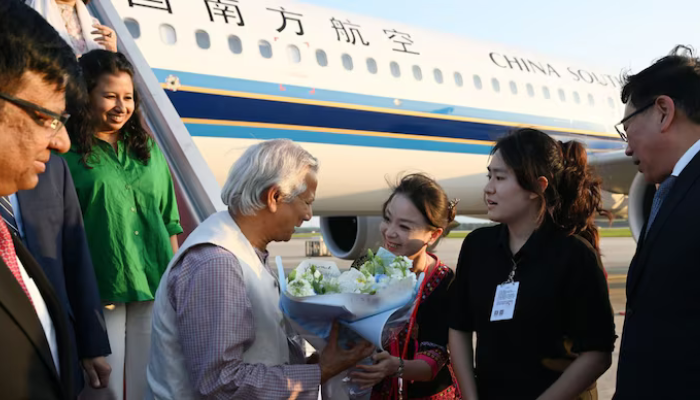
On Bangladesh’s Independence Day, Muhammad Yunus, the Chief Adviser of the interim government, made a notable departure for China, landing at Qionghai Bo’ao International Airport in Hainan Province. This move, according to Bangladesh , carries a significant message. Yunus’s visit, which coincides with Bangladesh’s increasingly strained relationship with India, has drawn attention due to its timing. Just a day before, India had called for “mutual sensitivity” in its relationship with Bangladesh, signaling the need for a careful balancing of interests.
A Strategic Visit: Yunus’s Diplomatic Mission
Yunus, embarking on his first official bilateral trip after attending high-profile engagements in Davos, Washington DC, and Cairo, took off with a large entourage, including key advisers in foreign affairs, energy, transport, and infrastructure. The trip marks Yunus’s first state visit, and it holds critical importance, as emphasized by Chinese officials who have described it as “possibly the most important visit by a Bangladeshi leader in 50 years.”
The timing of Yunus’s visit is far from coincidental. His decision to engage China rather than India signals a strategic pivot for Dhaka. Yunus had initially planned to visit India first but did not receive a positive response from New Delhi, according to his press secretary. This marks a subtle yet powerful statement from Bangladesh to its neighbor.
What’s on the Agenda in China?
Yunus’s trip is packed with high-level engagements, including meetings with Chinese President Xi Jinping, speeches at the Boao Forum for Asia, and interactions with Chinese CEOs. Additionally, Yunus will receive an honorary doctorate from Peking University, further solidifying ties with China. One of the key aspects of the visit will be discussions on economic cooperation, with topics such as a healthcare grant of USD 138 million, a potential Bangladesh-China Free Trade Agreement (FTA), and a revised bilateral investment treaty on the table.
China, already Bangladesh’s largest trading partner, has ramped up investments in key sectors, especially in infrastructure. With more than 14 Chinese firms investing over USD 230 million in Bangladesh since Yunus assumed office, the growing Chinese influence is evident. Yunus’s visit is expected to secure financial backing for Bangladesh’s struggling economy, particularly in light of diminishing Western aid and a cooling relationship with India.
Geopolitical Implications for India
India, closely monitoring the growing Bangladesh-China relations, is wary of the strategic implications of such ties. Any further Chinese involvement in Bangladesh’s infrastructure, such as the development of the Chinese Economic Zone in Chattogram, could shift regional dynamics, particularly in India’s eastern borders. Furthermore, India is keenly observing how Dhaka aligns with Beijing on the “One-China” policy, a stance that has not been consistently reaffirmed since the tenure of Sheikh Hasina.
From India’s perspective, Bangladesh’s growing engagement with China raises questions about the balance of power in South Asia. With China’s increasing footprint, both economically and geopolitically, India is likely to remain vigilant in its dealings with Bangladesh.
India’s Response: A Call for Mutual Sensitivity
India, however, continues to extend diplomatic courtesies. On Bangladesh’s Independence Day, President Droupadi Murmu and Prime Minister Narendra Modi sent their greetings to Yunus and the people of Bangladesh, highlighting the shared history of the 1971 Liberation War. Prime Minister Modi’s message underscored the need for “mutual sensitivity to each other’s interests and concerns,” reflecting India’s desire to maintain peace and stability in the region.
While India emphasizes shared history and strategic partnership, it is clear that New Delhi’s priority remains ensuring that its relationship with Bangladesh moves beyond any current tensions, seeking greater collaboration for regional stability and prosperity.
In Conclusion: A Geopolitical Shift in South Asia
Yunus’s visit to China on such a significant day is not just a diplomatic trip but a message that resonates beyond bilateral relations. With Bangladesh forging stronger ties with China, India will likely reassess its approach to its eastern neighbor. For Bangladesh, securing economic support and strategic partnerships is crucial in its efforts to stabilize its economy, but for India, this evolving dynamic will require careful navigation to maintain the balance of influence in South Asia.
As Bangladesh balances its relationships with both India and China, the world watches closely to see how this geopolitical shift will play out in the years to come.

